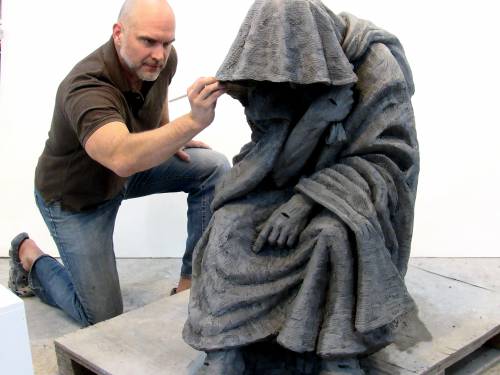Lord, When Did We See You?
A Matthew 25 Lenten Experience
By Donna Frischknecht Jackson
Download Devotional Bahasa Indonesia Mandarin Chinese (普通話)
When I think of living a Matthew 25 life, the words to the hymn written in the early 20th century by Thomas O. Chisholm, “Living for Jesus,” plays in my head: Living for Jesus, a life that is true, striving to please him in all that I do.
As I hum the tune, I begin questioning, “Am I really living for Jesus? Is all that I do pleasing to him?” Perhaps you have asked yourself the same.
In the spring of 2019, the Presbyterian Church (U.S.A.) embarked on an exciting transformation, inviting churches to live for Jesus in a big and bold way by committing to becoming Matthew 25 congregations. By framing the work of the church based on the words Jesus spoke in Matthew 25:31–46 — “I was hungry, and you fed me,” “I was thirsty and you gave me something to drink,” “I was sick and you cared for me,” etc. — congregations not only began strengthening their connection to one another by sharing a common mission, but communities began changing as those beyond the church doors began seeing that the “love of God has skin on it,” as the Rev. Dr. Diane Moffett, president and executive director of the Presbyterian Mission Agency in Louisville, says.
Living for Jesus in a Matthew 25 way is igniting a movement among many Presbyterian churches, leading to innovative missions and ministries and a renewed sense of belonging and hope. At the start of 2022, 934 congregations, 74 presbyteries and 10 synods have accepted the Matthew 25 invitation, committing to using their hands, feet and hearts in mission and ministries that focus on one or all three areas: 1) building congregational vitality, 2) dismantling structural racism, and 3) eradicating systemic poverty.
As the Matthew 25 invitation marks its third anniversary this April, Presbyterians are invited to delve more deeply into the Scripture passage that has gained so much mission momentum. This Lenten devotional is an opportunity to pause and ponder what it means to live for Jesus. It doesn’t matter if you and your church have been a Matthew 25 congregation for a while, have just accepted the invitation, or are currently discerning whether to officially become a Matthew 25 congregation, this devotional is for everyone at every stage. It is a time to listen again to Jesus’ words and open your heart and ask, “How can I live for you?”
Using this devotional
This devotional spends time each week exploring one of Jesus’ many Matthew 25 “I was” statements, beginning with Ash Wednesday.
First Days of Lent: Inherit the Kingdom
Week 1 in Lent: I was hungry; you fed me.
Week 2 in Lent: I was thirsty; you gave me something to drink.
Week 3 in Lent: I was a stranger; you welcomed me.
Week 4 in Lent: I was naked; you gave me clothing.
Week 5 in Lent: I was sick; you took care of me, I was in prison; you visited me.
Holy Week and Easter: Just as you did it to one of the least of these, you did it to me.
Coupled with days of reflections will be the following opportunities to experience Lent in a new way:
Sunday Matthew 25 Spotlights
Each Sunday in Lent will feature one such congregation in the Matthew 25 Spotlight. You are invited to watch the short video and reflect on what that community is doing to be the embodied love of God to others.
Monday Spiritual Practice
Spiritual practices during Lent are a wonderful way to slow down and to make a space for listening to God. Each week, you will be introduced to a spiritual discipline and given ideas for carrying that practice out.
Wednesday Soup and Reflection
Lent has traditionally been a time for churches to open their doors and invite folks to come for a simple soup meal and a time of prayer. With pandemic precautions still prevailing in many parts of our country, this year’s devotional offers you a soup recipe to have your own “soup and reflection” time. Even better is if you make an extra batch of soup and create a Lenten care package for a neighbor or friend.
I hope you find this Lenten devotional to be an eye-opening Matthew 25 experience. It is my prayer that come Easter morning, our eyes will see anew the many opportunities we have each day to live out the Matthew 25 vision — and by doing so, live for Jesus in all that we do.
Blessings,
Donna Frischknecht Jackson
About the author
The Rev. Donna Frischknecht Jackson is the editor of Presbyterians Today. An ordained minister in the Presbyterian Church (U.S.A.), Frischknecht Jackson has spent her pastorate career serving rural churches. She has authored Presbyterians Today’s 2020 and 2021 Advent and Christmas devotionals and is excited to bring reflections for the Lenten season. You can email her at Donna.Jackson@pcusa.org.

About the sculptures
The sculptures featured in this Lenten devotional are the creations of Timothy P. Schmalz, a Canadian artist based in Ontario. A sculptor for more than 25 years, Schmalz is best known for his Matthew 25 series. He has often likened his work to that of “visual sermons” available to the public 24-hours a day.
Schmalz’s Matthew 25 series, as well as sculptures honoring veterans and firefighters, have been installed worldwide, including almost every state within the U.S.
The artist’s public relations manager did share their hopes for a Schmalz original to be commissioned someday in Burlington, Vermont.
Discover more about the artist, by visiting: sculpturebytps.com
The First Days in Lent
Ash Wednesday | March 2

By the sweat of your face you shall eat bread until you return to the ground, for out of it you were taken; you are dust, and to dust you shall return. — Genesis 3:19
Repent and believe
Growing up, having foreheads smudged with burnt palm ashes was something my Catholic and Anglican friends did. We didn’t do it in the Congregational church of my childhood nor in the Presbyterian church I attended as a teen. Yet I was intrigued by the practice, mostly by how my friends seemed different once they sported smudges that looked more like abstract art rather than the crisp crosses they were meant to be. The brazen was subdued. The bully was quieted. The confident turned uncharacteristically awkward. It was as if suddenly the world could see their frailty. It made me relieved that I didn’t get ashes. I outgrew that relief, and now embrace Ash Wednesday’s somber reminder, echoed in the words from Genesis that accompany the ash crosses: Remember, from dust you come and to dust you return. Remember. We are not our own. We belong to God, and one day we will return to God.
There’s an alternate phrase that can be said when imposing ashes: Repent and believe in the Gospel. I prefer that to the mention of dust, for the “repent” spurs me to reorient my life and take seriously the Gospel’s message of love. And each year, as I feel the grit of the ash against my skin, I think of another cross once placed on our foreheads. The one that made us squirm and squeal as infants: the watery baptismal cross marking us as God’s beloveds. One day, our baptisms will be made complete at the time of our death. Till then, Ash Wednesday comes, reminding us time is slipping by. Inwardly we squirm. Silently we squeal. The smudge is made. The question is asked: When life is over, have I done my best to love as Christ loved?
Pray
Redeeming God, we remember this day the fragility of our lives. We remember that through all our days, we belong to you. May we return to you and learn this Lent to truly love the world you created. In Jesus’ name, we pray. Amen.
Ponder
What would others say about how you have lived your life for Christ? How do you currently show the love of Christ to others? Where can you do better?
Then the king will say to those at his right hand, “Come, you that are blessed by my Father, inherit the kingdom prepared for you from the foundation of the world.” — Matthew 25:34
Thursday | March 3
Again, the devil took him to a very high mountain and showed him all the kingdoms of the world and their splendor; and he said to him, “All these I will give you, if you will fall down and worship me.” Jesus said to him, “Away with you, Satan! for it is written, ‘Worship the Lord your God, and serve only him.’” — Matthew 4:8–10
Kingdom or kin-dom?
I met Krystle while freelancing for a small-town newspaper. She was young and talented — and the editor of the paper. I was impressed. So, when the need for a freelance editor arose for a project at the national church, I recommended Krystle. She was hesitant as she didn’t know “insider church language.” I assured her that I would answer any questions.
Krystle did have one question about a word she had never heard of before: kin-dom. “Did the writer mean ‘kingdom’?” she asked. When I explained that kin-dom reflected better the mission of the Church, moving away from top-down power and control, which the word “kingdom” evokes, to a more level playing field where there is a kinship — where the silenced have a voice and the overlooked are recognized — she enthusiastically said, “That’s awesome!”
Krystle isn’t much for religion. She jokes that she can’t believe she is friends with me — a pastor. She, like many, have been hurt by worldly kingdoms that have often been protected and perpetuated by organized religion. Yet we in the Church still find ourselves tempted by the power such kingdoms offer. We always seem to be wrestling with our desirous idols.
Lent begins with Jesus being tempted in the wilderness where the promise of earthly kingdoms is dangled in front of him. Jesus, though, is steadfast and resists. We too, need to be steadfast and resist, emerging from our wilderness temptations ready to commit to building more Matthew 25 kin-doms.
“Is ‘kin-dom’ the correct word?” Krystle asked. “It is,” I said. And with that, a child of God, who never thought she was welcomed into the fold, began seeing the door to the kin-dom open to her.
Pray
Loving God, temptations are all around us. The world tells us that those who have the power, those who have the wealth and those who have the prestige are the ones who have it all. But that is not the way of your kingdom. Yours is a kin-dom, where all are welcomed, valued and loved. Help us to become kin-dom builders. In Jesus’ name, we pray. Amen.
Ponder
Jesus told his friends that when they did something to help another in need, they were serving him. As you go about your day, think about the decisions you make and the actions you take. Now ask yourself: Is my life reflecting a worldly kingdom or a Matthew 25 kin-dom?
Ponder: When you hear the word “kingdom” what comes to mind? What are some responsibilities that come with inheriting the kingdom Matthew 25 mentions?
Friday | March 4
Blessed are the meek, for they will inherit the earth. — Matthew 5:5
Inheritances
I recently came across a study from 2019 that showed the average inheritance for the middle class in the U.S. was about $110,000. I don’t count on such money coming my way anytime soon — or ever. But sometimes I wonder: What if? What would I do with that money?
It doesn’t take long for my daydream windfall to become a greed-ridden nightmare, as I discover my imaginary money isn’t enough for all the wants lurking within. I shudder to think what a real inheritance would bring out in me.
Matthew 25 speaks about inheriting the kingdom. This kingdom, though, is not one that comes in the way of a big check. In fact, there are many congregations with small budgets in the PC(USA) who have said “yes” to becoming Matthew 25 churches. They’re saying “yes” to inheriting a kingdom that will not bolster their wealth, but rather asks them to serve, care and love others selflessly.
 Early in his ministry, Jesus spoke to a hungering crowd gathered on a hillside. They were eager to hear a message of hope, and Jesus didn’t let them down by telling them what it really means to be blessed. But his definitions of blessed might have surprised them for there was no mention of material comforts or elevations of status. Among the blessed, Jesus tells them, are the meek. For they will inherit the earth.
Early in his ministry, Jesus spoke to a hungering crowd gathered on a hillside. They were eager to hear a message of hope, and Jesus didn’t let them down by telling them what it really means to be blessed. But his definitions of blessed might have surprised them for there was no mention of material comforts or elevations of status. Among the blessed, Jesus tells them, are the meek. For they will inherit the earth.
Meek isn’t a very flattering adjective to our ears, but in the biblical context it is a compliment. It means that we are willing to surrender all to Jesus and say “yes” to God’s plans. If we are to inherit God’s kingdom, we must see that this kingdom has nothing to do with what money can buy. This kingdom is about what love can build through the work of our hands.
Pray
God of great provision, forgive us for letting the amount of money we have dictate the ministries we can do in your name. The kingdom we inherit from you is in fact this world, with all its challenges and brokenness. This is the kingdom you entrust to us. Give us the wisdom and strength this day to glorify you. In Jesus’ name, we pray. Amen.
Ponder
When the word “meek” is used to describe you, how does that make you feel? Now think about how Jesus uses that word. How might it change the way you live this day?
Saturday | March 5
I give you a new commandment, that you love one another. Just as I have loved you, you also should love one another. — John 13:34
Go therefore and make disciples of all nations, baptizing them in the name of the Father and of the Son and of the Holy Spirit, and teaching them to obey everything that I have commanded you. And remember, I am with you always, to the end of the age.” — Matthew 28:19–20
A command and a commission
I worked in a church that had a stunning stained-glass window of “The Great Commission,” where Jesus, before ascending into heaven, tells his disciples to go out into the world and make more disciples. Next to it was a window depicting another one of Jesus’ marching orders before leaving this world: Love one another, as I have loved you.
I never thought much about how the “command” and “commission” windows were side by side. That is until the day the rural congregation I served became a Matthew 25 church. The educated and well-off session members reviewed the three ministry focuses of the Matthew 25 invitation: building congregational vitality, dismantling structural racism, and eradicating systemic poverty. Like many congregations who have seen numbers dwindle dangerously low to the “closing-the-doors” level, they zeroed in on vitality over eradicating poverty and dismantling racism.
All too quickly, building vitality began looking like programming to get people into the pews. My heart broke. I reminded them that Matthew 25 was not a program to save a church. Rather, it’s an invitation to die to self to save others. It’s about boldly living as the body of Christ, and that living begins with loving as Christ loves. “That means loving all the shoppers in the local Walmart that I have heard this congregation talk disparagingly about,” I dared to say.
When Jesus said, “Love one another,” he didn’t want lip service. He wanted love to be shown in our actions that would transform a community — and, thus, the world. We are at the beginning of our Lenten journey. There are still more weeks to tread all the rough and undesirable places Jesus has already gone. But it’s here that we take a spiritual stop to examine our hearts before venturing further. We must be honest and question our commitment to Jesus’ command and commission. “Lord, when did we see you?” we ask. And he will answer, “When you began loving as I have loved, you have seen — truly seen. Now go with that love in your heart and make disciples.”
Pray
All-knowing God, you see how often we speak about love and how rarely we show it. In this season of Lent, help us go beyond words. May the world see your love through our actions. In Jesus’ name, we pray. Amen.
Ponder
What are the ways in which love can become a verb as you go about living this day?
